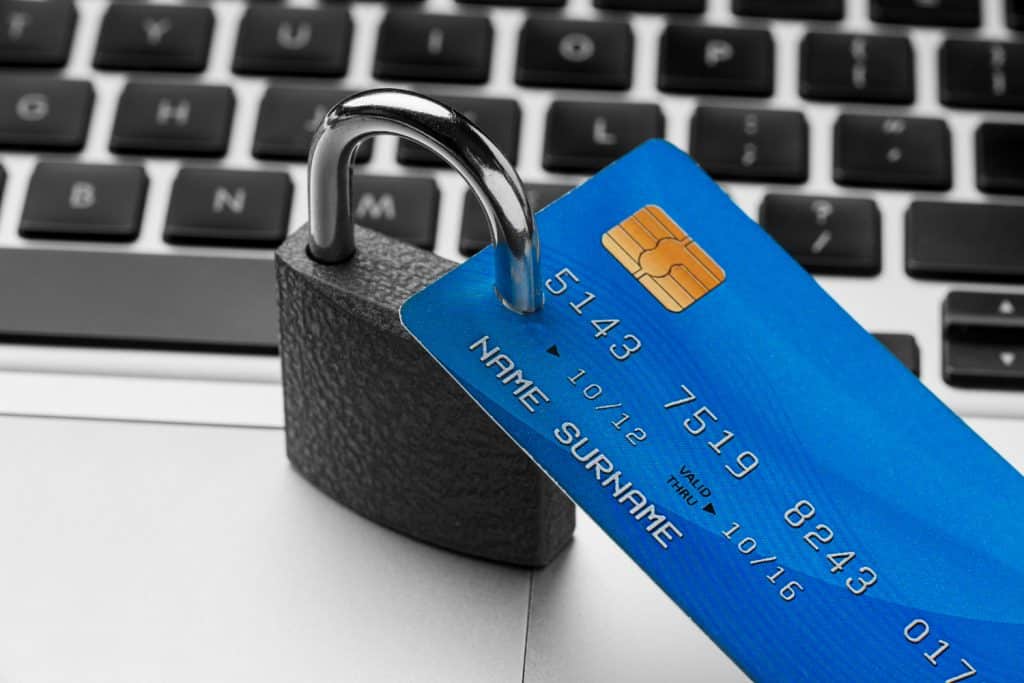Credit card protection: Types, benefits, and tips to stay secure

Anúncios
Credit card protection is essential to safeguard your finances and ensure peace of mind in an increasingly digital world.
From built-in fraud protection and purchase damage coverage to optional insurance for unexpected challenges, credit card protection programs offer a wide range of benefits.
Understanding these protections helps you optimize your card’s features and prepares you to make decisions about additional insurance options and personal security practices.
Let’s explore the various types of credit card protection, discuss whether credit card insurance is worth the cost, and provide practical tips to keep your card secure.
By the end, you’ll have a comprehensive understanding of how to protect your finances and maximize your credit card benefits. Keep reading!

Types of credit card protection
Credit card issuers often include a variety of protections as built-in features, offering cardholders financial and practical security.
These protections, which vary by card type, are designed to enhance your financial safety while adding convenience to your purchases.
Fraud Protection
Fraud protection is a fundamental feature of most credit cards, shielding cardholders from unauthorized transactions.
Under federal law, liability for fraudulent charges is limited to $50, but many issuers go further by offering zero-liability policies.
This means cardholders are not held responsible for any fraudulent transactions if reported promptly.
Credit card companies use advanced fraud detection systems to monitor suspicious activities, alerting users immediately if something seems off.
Reporting a lost or stolen card is crucial to ensuring full protection against fraudulent activities.
Price Protection
Price protection allows cardholders to claim a refund if the price of a purchased item drops within a specific timeframe, typically 30 to 120 days.
By submitting proof of the lower price along with the purchase receipt, you can recover the price difference.
This benefit eliminates the stress of regretting purchases due to price fluctuations, making shopping more confident.
Although not all credit cards offer this feature, those that do provide a valuable safety net for price-conscious consumers.
Purchase Protection
Purchase protection covers eligible items bought with your credit card against theft or accidental damage for a specific period, typically 90 to 120 days after purchase.
Depending on the card issuer, this protection may offer repair, replacement, or reimbursement for the item’s cost.
Coverage limits and claim processes vary, so it’s essential to review the specific terms of your credit card.
This feature is especially beneficial for high-value purchases, adding an extra layer of security to your spending.
Travel Insurance
Travel insurance benefits provided by credit cards can save money and hassle during trips.
Common features include coverage for trip cancellation or interruption, reimbursement for lost or delayed baggage, and emergency medical assistance.
These protections are particularly valuable for international travel, where unforeseen expenses can quickly escalate.
Before relying on your credit card’s travel insurance, check its specific terms to ensure the coverage aligns with your planned activities.
Rental Car Insurance
Many credit cards offer rental car insurance, also known as collision damage waiver (CDW). This benefit covers repair or replacement costs if a rental car is damaged or stolen.
It eliminates the need to purchase additional coverage from the rental company.
It’s important to understand whether your card provides primary or secondary coverage and to check for exclusions, such as luxury vehicles or certain countries.
This feature is an excellent way to reduce travel-related expenses while staying protected.

What is credit card insurance?
Credit card insurance, also known as payment protection or credit safeguard, is an optional service offered by financial institutions.
Unlike built-in credit card protection programs, credit card insurance provides additional financial assistance during times of hardship.
This insurance typically covers your minimum payments — or even the full balance — if you face involuntary unemployment, disability, or other emergencies.
The cost of credit card insurance is generally calculated as a percentage of your outstanding balance and is charged monthly.
While it offers peace of mind during challenging circumstances, it’s crucial to carefully evaluate the terms, costs, and exclusions to determine if it’s the right choice for you.
Is credit card insurance worth it?
Whether credit card insurance is worth the cost depends on your financial situation and the protections already provided by your card.
Benefits
Credit card insurance can provide critical financial support during unexpected life events.
If you lose your job, face a medical emergency, or encounter other difficulties, this insurance ensures your credit card payments are covered, helping you avoid late fees, penalties, and a damaged credit score.
For those without substantial emergency savings, credit card insurance can act as a financial safety net during challenging times.
Disadvantages
The main drawback of credit card insurance is its cost, which can add up over time, especially for those carrying high balances.
Monthly premiums are based on your outstanding balance, meaning the more you owe, the higher the fee.
Additionally, the coverage may include limitations, such as waiting periods, exclusions for pre-existing conditions, or caps on benefit amounts.
Some consumers may find that other forms of insurance, such as disability coverage or emergency savings, make credit card insurance redundant.
Tips to keep your credit card secure
Maintaining the security of your credit card is paramount to avoiding fraud and unauthorized transactions. Follow these tips to stay protected:
- Monitor your statements regularly: Review your credit card statements frequently to identify unauthorized charges early.
- Enable alerts for suspicious activity: Set up notifications to receive immediate alerts about unusual transactions or login attempts.
- Avoid using public Wi-Fi for transactions: Public networks are more vulnerable to hackers. Enter card details only on private and secure networks.
- Use strong passwords for online accounts: Create complex passwords for accounts linked to your card and update them periodically.
- Keep your physical card secure: Store your card in a safe place and report it immediately if it is lost or stolen.

Implementing these practices ensures better protection for your credit card and reduces the risk of financial fraud.
Credit card protection is a vital aspect of managing your finances responsibly.
By understanding the different types of protections available — such as fraud prevention, purchase coverage, and travel insurance — you can optimize the benefits offered by your credit card.
Weighing the pros and cons of credit card insurance helps you make an informed decision about whether it’s right for you.
In addition to relying on built-in features and optional insurance, staying proactive with security measures ensures your credit card remains safe from fraud and misuse.
For more insights and practical advice on managing your credit cards, continue exploring our resources and make the most of your financial tools.
Looking for more tips? Check out this content explaining everything you need to know about secured loans.





